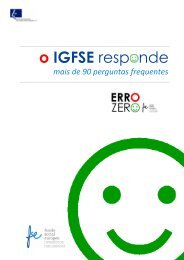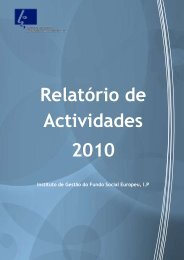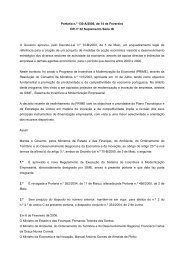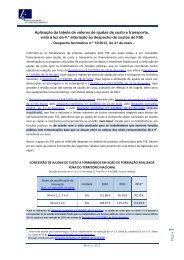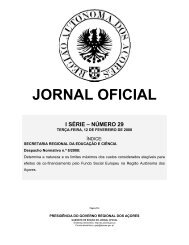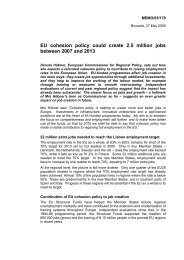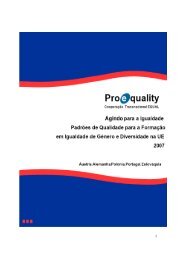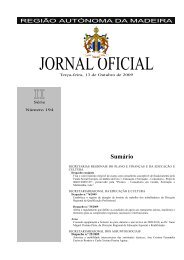Industrial Relations in Europe 2012 - European Commission - Europa
Industrial Relations in Europe 2012 - European Commission - Europa
Industrial Relations in Europe 2012 - European Commission - Europa
You also want an ePaper? Increase the reach of your titles
YUMPU automatically turns print PDFs into web optimized ePapers that Google loves.
The agreement is a significant achievement for the EU social dialogue <strong>in</strong> the professional football<br />
sector. Its ma<strong>in</strong> goal is to offer m<strong>in</strong>imum social standards concern<strong>in</strong>g players' contracts. To ensure<br />
that player contracts throughout <strong>Europe</strong> meet certa<strong>in</strong> m<strong>in</strong>imum standards, contracts must be <strong>in</strong><br />
writ<strong>in</strong>g and registered and must be signed by the parent or guardian <strong>in</strong> the case of a m<strong>in</strong>or player.<br />
Contracts must def<strong>in</strong>e the respective obligations of clubs and players. On the clubs' side, this<br />
<strong>in</strong>cludes provisions on regular payment of salaries, social security or paid leave and mandatory<br />
<strong>in</strong>surance coverage. The club must respect m<strong>in</strong>imum wages for the players, if this has been agreed<br />
by social partners at national level. On the players' side, contracts must also refer to their duty to<br />
participate <strong>in</strong> tra<strong>in</strong><strong>in</strong>g, to ma<strong>in</strong>ta<strong>in</strong> a healthy lifestyle and to comply with discipl<strong>in</strong>ary procedures.<br />
Standard contracts will also conta<strong>in</strong> provisions on dispute resolution and applicable law. Further,<br />
the agreement provides that clubs and players will contractually commit themselves to act aga<strong>in</strong>st<br />
racism and other discrim<strong>in</strong>atory acts and to fight aga<strong>in</strong>st dop<strong>in</strong>g <strong>in</strong> football. The agreement also<br />
conta<strong>in</strong>s provisions related to the protection of young sportspersons, <strong>in</strong> particular paragraph 6.5<br />
which obliges clubs to respect Council Directive 94/33/EC of 22 June 1994 on the protection of<br />
young people at work and to ensure that every youth player <strong>in</strong>volved <strong>in</strong> its youth development<br />
programme has the right to follow mandatory school education <strong>in</strong> accordance with national law and<br />
that no one is prevented from cont<strong>in</strong>u<strong>in</strong>g their non-football education.<br />
The EU social partners <strong>in</strong> the professional football sector have committed themselves to<br />
autonomously implement<strong>in</strong>g the agreement by us<strong>in</strong>g the most appropriate legal <strong>in</strong>struments as<br />
determ<strong>in</strong>ed by the relevant parties at national level <strong>in</strong> the EU and <strong>in</strong> the rema<strong>in</strong><strong>in</strong>g countries of the<br />
UEFA territory. The agreement has been accompanied by a jo<strong>in</strong>t letter stipulat<strong>in</strong>g that <strong>in</strong> a certa<strong>in</strong><br />
number of countries the standard of contractual protection is already above the standards provided<br />
for <strong>in</strong> the autonomous agreement and, consequently, no further action is required. The agreement<br />
should be implemented no later than three years after its date of signature <strong>in</strong> all countries<br />
concerned.<br />
The agreement, its implementation and monitor<strong>in</strong>g is not only an expression of the autonomy of the<br />
social partners, but also of the autonomy of sport as recognised <strong>in</strong> the Lisbon Treaty.<br />
Hairdress<strong>in</strong>g<br />
The agreement of the social partners <strong>in</strong> the personal services (hairdress<strong>in</strong>g) sector, Coiffure EU and<br />
UNI <strong>Europa</strong> Hair & Beauty, is a comprehensive framework agreement on the protection of the<br />
occupational health and safety of workers <strong>in</strong> the sector. It was signed on 26 April <strong>2012</strong> and aims to<br />
reduce the risk of occupational diseases and accidents <strong>in</strong> hairdress<strong>in</strong>g, <strong>in</strong> order to protect the health<br />
and safety of workers. This is part of the overall objective of the EU sectoral social partners to<br />
<strong>in</strong>crease the professionalism and profitability of the hairdress<strong>in</strong>g sector. The negotiations on this<br />
agreement were launched on the own <strong>in</strong>itiative of the <strong>Europe</strong>an social partners and built upon their<br />
previous work on health and safety.<br />
There is scientific evidence that hairdressers are exposed to high risk of occupational disease, <strong>in</strong><br />
particular sk<strong>in</strong> diseases and musculoskeletal disorders. Hairdressers are affected by these diseases to<br />
a much greater extent than the general population. Therefore, s<strong>in</strong>ce the establishment of the sectoral<br />
social dialogue committee <strong>in</strong> this sector <strong>in</strong> 1999, the social partners have worked on these issues,<br />
conclud<strong>in</strong>g a jo<strong>in</strong>t declaration ("covenant") on health and safety <strong>in</strong> 2005. New scientific research<br />
conducted s<strong>in</strong>ce then documented cont<strong>in</strong>u<strong>in</strong>g high rates of risk and uneven progress between and<br />
264



